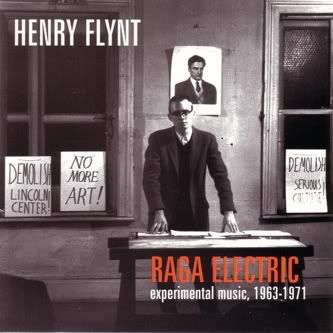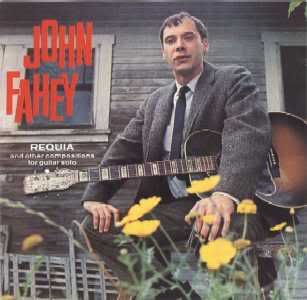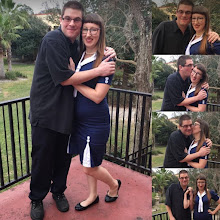
Locust, 2002; available
7 tracks, 32:42
I'm back! I had to focus on schoolwork and other life events for a bit; did you miss me? Well, even if you didn't, expect updates more frequently and now on to the review!
The works of Henry Flynt aren't for the faint of heart. It should say a lot that he's probably best known by music fans for being kicked out of the Velvet Underground for daring to play Appalachian-style fiddle! Most of his recorded work is an avant-garde take on hillbilly and/or raga music, with a few rock and tape music albums as well*. As is often the case, most of these works have seen the light of day via archival releases such as this one. Collecting some experimental works from 1963 to 1971, RAGA ELECTRIC is some of the most intimidating Flynt on record. Well, for the most part anyway. Opening track "Marines Hymn" (1971) is a genuinely trance-inducing raga take on the classic military tune, performed on acoustic guitar and chanted vocals. This track is actually one of Flynt's prettiest, but it sure doesn't prepare you for the rest of the disc! The four "Central Park Transverse Vocal" pieces (1963) are exactly that: weird avant-vocalisations recorded in the titular tunnel. As crazed as they are, "Raga Electric" itself (1966) is absolutely insane! While musically it is a genuine raga performed on what seems to be multi-tracked electric guitar, Flynt's vocal performance defies most attempts at categorization. Shrieks, howls, chants, and general weirdness is the order of the day, and the resulting performance can be terrifying or laughable depending on mood. Fans of Ono and Galas could very well consider Flynt their male counterpart based on this performance. Finally, the epic-length "Free Alto" (1964) is self-explanatory. While a bit long, it does have some interesting squeals and skronks that make it worth hearing. This is a great collection with some interesting tracks, but the intense and abstract nature of the program doesn't make for everyday listening. Check out some of the albums in the footnote if you're a Flynt newbie and then pick this up; he really is an acquired taste.
*Other Flynt albums I can recommend are I DON'T WANNA, a lo-fi proto-punk gem with a full band (the Insurrections); C TUNE and PURIFIED BY THE FIRE, each of which is a forty-plus minute wonder of violin and tamboura raga; and the self-explanatory HILLBILLY TAPE MUSIC. These aren't nearly as intense as RAGA ELECTRIC and might make a better starting point.

